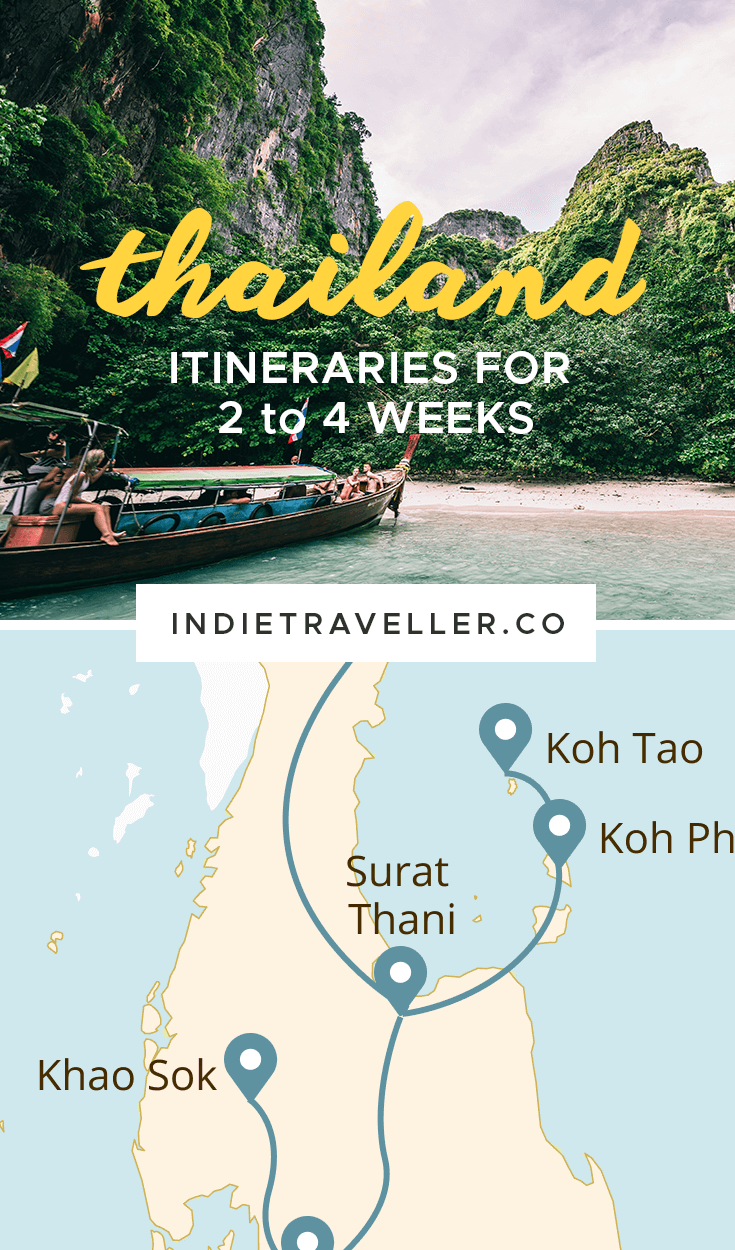Thailand Itinerary for 2 to 4 Weeks (North + South Highlights)

From the jungle-clad mountains in the north to the beach-lined islands in the south, Thailand is just filled with wonderful places. It’s quite a big country though, so if you want to sample all it has to offer within a few weeks, you’ll want to follow a good route.
In this example itinerary, I’ll run you through some of the popular destinations in Thailand. It’s a classic Thailand itinerary combining cultural, nature, and beach highlights.
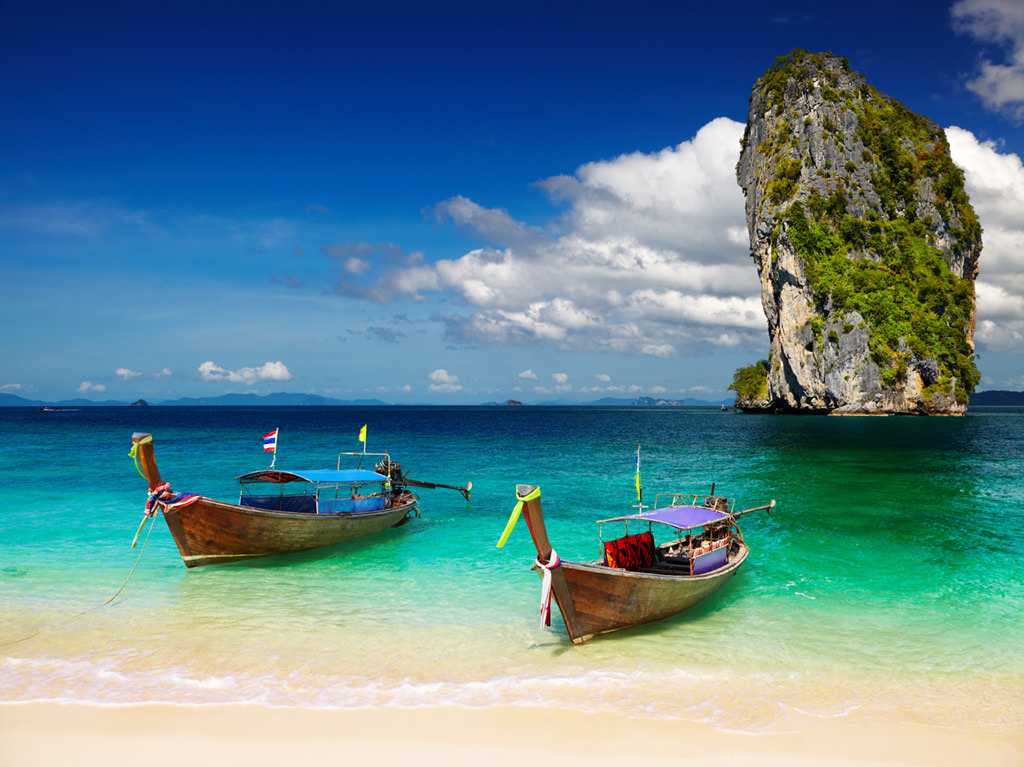
This itinerary is ideal for backpackers or anyone traveling independently and looking for a mix of adventure/culture and relaxation.
I encourage using it as a starting point and making your own adjustments based on your interests and time available.
Example Itineraries
Part I: Bangkok to northern Thailand

1. Bangkok (half or 1 day)
Since most visitors fly into Bangkok, it’s the obvious starting point.
Just one warning: if you haven’t been to a city quite like Bangkok before, it can be a bit of a shock to the senses!
It’s very chaotic with a lot of traffic — and a lot of smells and sounds. Bangkok is not always love at first sight, especially when travelers have just suffered a long international flight.

I actually think Bangkok is amazing, but you may find it easier to appreciate on a second visit. That’s why I recommend making a brief initial stop, then exploring it more fully at the end of your Thailand trip.
Use your first (half) day to get through your jet lag, acclimatize to the hot weather, and to take your first dive into the incredible Thai cuisine.
Check out a few sights like the temples of Wat Phra Kaew and Wat Pho, or visit the tourist district around Khao San Road (it’s tacky but fun).
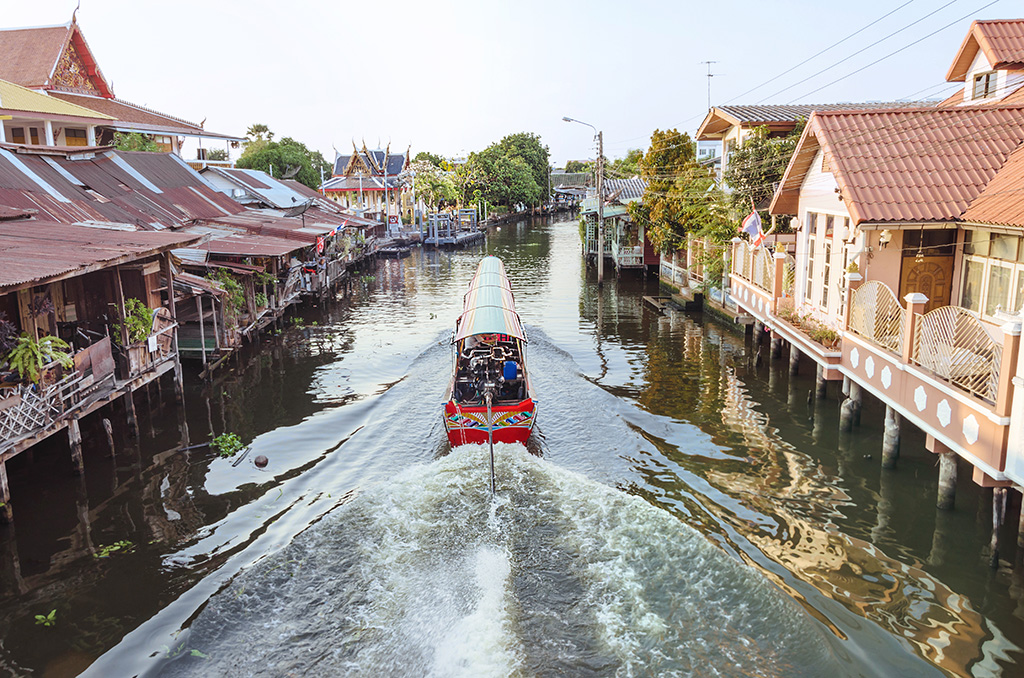
On my first ever Bangkok visit I went on a fantastic bicycle and boat tour. This was a very relaxed way to see the local and unique side of Bangkok. I’m Dutch and we love riding bicycles… but I know that we’re weird like that, so alternatively here’s a recommended tuk-tuk tour that will take you to several local markets and temples.
If you prefer to see Bangkok turned up to 11, go to Chinatown. It’s a hugely vibrant place and amazing for photography and random exploration. Or keep it for later if you prefer to ease into things a little.
2. Bangkok > Sukhothai (1 day)
It’s time to see some ancient temples!
There are two big complexes of temple ruins in Thailand: Ayutthaya and Sukhothai.
Ayutthaya is conveniently only 2 hours from Bangkok. However, it will be busier with day-trippers and it’s also inside a city. I like Sukhothai a bit more as it’s in a more open space.
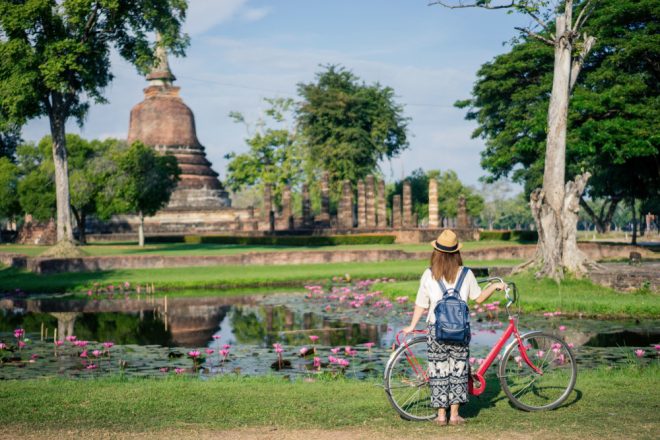
From Bangkok, take a bus or train to Sukhothai (about 8 hours). I quite like taking the train as it’s nice to watch the landscapes through the window and you’ll get a nice preview of rural Thailand.
Spend a day exploring the temple ruins of Sukhothai, then stay the night there or head on straight to Chiang Mai.
Alternatively, take a day trip from Bangkok to Ayutthaya and then take the 12+ hour overnight train to Chiang Mai. You save time by traveling mostly at night, and the sleeper train counts as a fun travel experience as well.
Book transportation for this itinerary
3. Sukhothai > Chiang Mai (3+ days)
Chiang Mai may be Thailand’s second-biggest city, but it’s way more relaxed than Bangkok. It’s also very cheap, with some of the best-value accommodation around.
You can see how to get to Chiang Mai here.
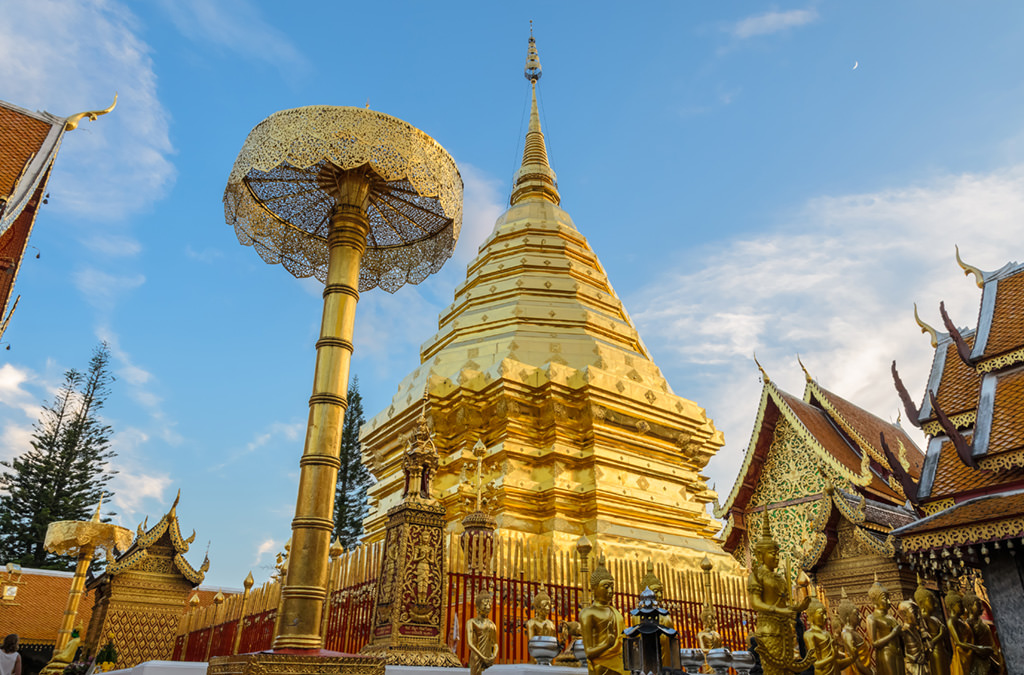
You probably won’t struggle to fill your time, as there are plenty of things to do in Chiang Mai. Be sure to stroll the night markets, go on day trips in the area, visit the Elephant Nature Park, go on a Thai cooking course, or go on a hill tribe trek (these are usually 1 or 2 days but can be longer).
Chiang Mai is very easygoing and there is so much to do here, which is why I think it’s nice to dedicate at least a few days here.
Nearly all travellers I meet in Thailand love Chiang Mai. It’s a perfect springboard for exploring the north of Thailand.
4. Chiang Mai > Pai or Chiang Dao (3+ days)
Where to go next from Chiang Mai?
Well, there are several options.
If you are a backpacker looking to have some fun, consider a stop in the small mountain town of Pai. It’s a funky little town among the rice fields and forest hills, and it’s filled with cozy hipster cafés and restaurants.
The hostels in Pai are good fun, though if you’re more into nature, then may take a liking to its many riverside bungalows and boutique guesthouses. Pai is a touristy place, so not the best if you’re determined to ‘see the real Thailand’, but it’s an easy place to be. Pai has hot springs, waterfalls, and a small canyon nearby.
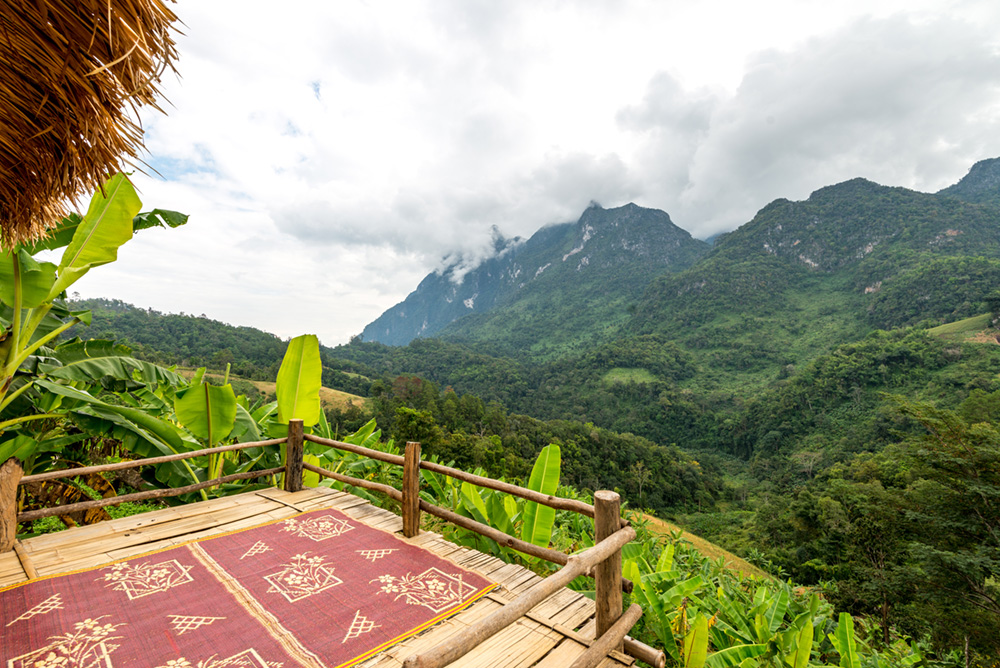
If you’re looking for somewhere more secluded, then the town of Chiang Dao makes for a good alternative. It has a quieter atmosphere and various small-scale attractions. It’s a lovely place to experience some jungle and mountain scenery.
Another fun adventure is to rent motorbikes and ride a loop through the thinly populated Mae Hong Son area. Along the way, you can visit the epic Tham Lod Cave, or stay the night in the Cave Lodge where local spelunkers will show you many secret caves.
5. (Optional) Chiang Rai (2 days)
Chiang Rai is a smaller city than Chiang Mai and makes for another good base for temple visits, trekking, and bicycle rides around the area. It’s a nice add-on if you have some time available! There are some good things to do in Chiang Rai province, such as making a day-trip to the hilltop town of Mae Salong.
Part II: Bangkok & Andaman Coast
This itinerary is all about beaches, islands, and national parks. You can do it on its own or tack it onto the previous northern Thailand itinerary.
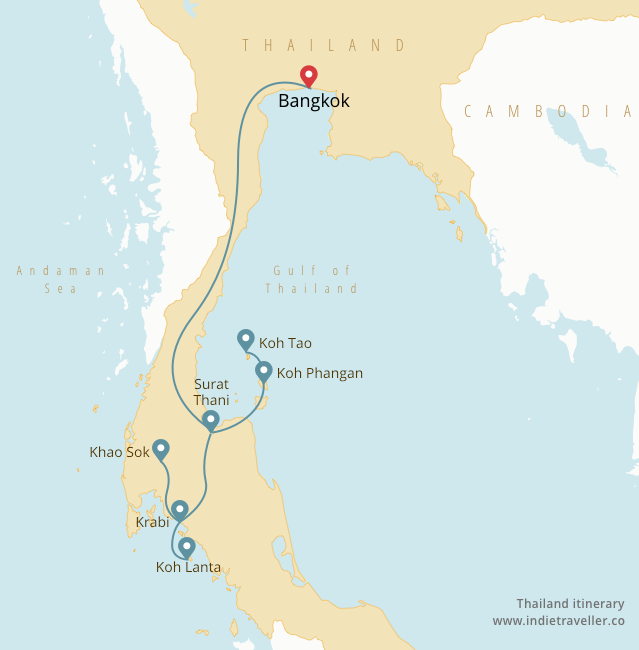
6. Northern Thailand > back to Bangkok (2 days)
If you’re coming from the north, dip back down into central Thailand. You could take the train back down, or if you want to speed things up a bit, take a domestic flight with a budget carrier such as AirAsia.
After so many relaxing days in Chiang Mai and Pai, you’re in a better state to dive deeper into chaotic Bangkok. You could visit the floating markets, see a Muay Thai fight, explore Chatuchak Weekend Market, or take a food tour.
And now that you’re no longer jet-lagged and still fresh off the plane, you might want to investigate the Bangkok nightlife more closely as well.
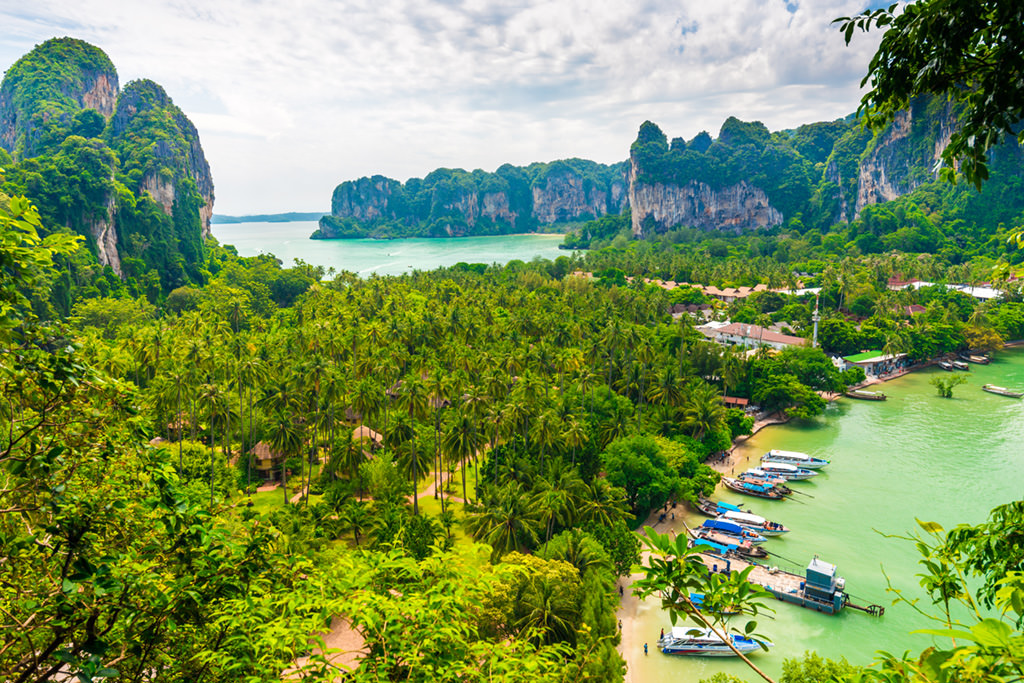
7. Bangkok > Krabi (2 days)
It’s time to go to the beach! Take a train to Surat Thani, and from there travel onwards to Krabi.
Alternatively, you can fly to Surat Thani with AirAsia, which also offers all-in-one tickets with ground transfer services to Krabi or the islands.
You can stay in Krabi town, but better yet, stay in Ao Nang as this will put you right along (or very near) the beach. While increasingly busy and pricey, you may want to go to nearby Railay Beach as well. It’s the famous Thai beach that has tall karst cliffs on either side. Speaking of cliffs: Krabi is famed for rock climbing, so if you’ve always wanted to take a rock climbing course, now is your chance.
By the way, the local authorities have begun using a ticketing system to control visitor numbers to Railay, and longtail boats are also now only allowed to dock in one area (this is a good thing). Again, Krabi can get very crowded, especially in high season, but a lot of people do love the scenery a lot. If you feel it’s too busy around these parts, consider escaping to the islands like Koh Lanta, Koh Ngai, Koh Jum, etc.
8. Krabi > Khao Sok National Park (3 days)
Wean yourself off the beach (there’ll be more of that soon!) for an exhilarating jungle tour.
While most things in these itineraries can be done independently, it is best to visit Khao Sok National Park on an organized tour. You will go into the jungle accompanied by a guide who can point out the wildlife and other interesting things, and you’ll be able to go on a boat ride deep into the park.
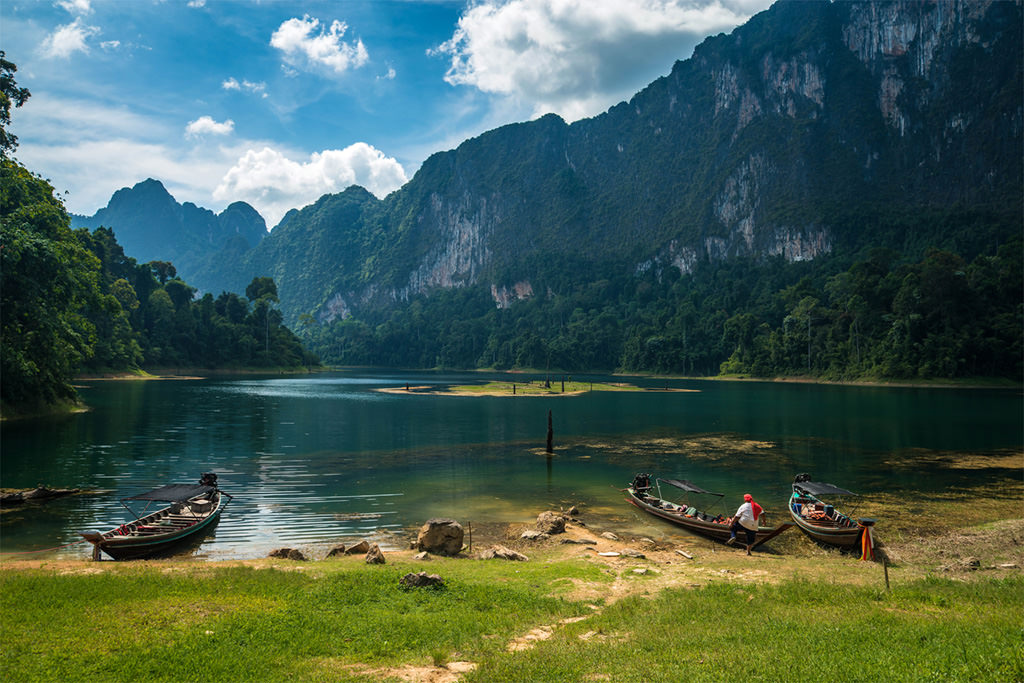
I think it’s a waste to book complete Thailand holiday tours where everything is organized for you because it’s so much easier (and usually) cheaper to plan everything yourself. But even as an independent traveller I think Khao Sok is something that is worth the money as it’s packed with experiences and something you can’t get on your own.
Khao Sok National Park tours
You can choose from various 2- and 3-day adventures. View Khao Sok tours at GetYourGuide or see Khao Sok tour options on Viator.
I don’t recommend only doing a day trip, which will only get you to the outer edge of the park, but I suggest going for 3 days to do it properly. This 3-day Khao Sok trip includes an overnight stay in a jungle treehut, a longtail boat cruise on Cheow Lan Lake, a cave visit, lunch at a bamboo raft house, and an ethical elephant experience.
9. Krabi > Koh Lanta (3 days)
While the island of Koh Phi Phi is the most famous on the Andaman coast, it’s also easily the busiest and most expensive. It also has a reputation for over-the-top-parties which, while not inescapable, do give the island a different vibe than others.
You could still make a quick stop there, but I recommend going to Koh Lanta instead for a more relaxed atmosphere. Koh Phi Phi has maybe gotten a bit too popular, while Koh Lanta has more space and more things to see around the island.
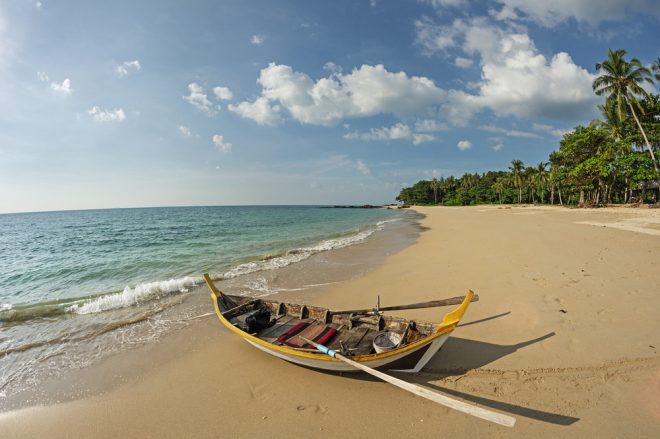
Since the construction of a bridge, you can easily reach Koh Lanta by minivan from Krabi. You can also take a ferry from Krabi, which is a little slower, but also a little more scenic.
If you’re looking for a great boutique resorts on Koh Lanta, check out Bambie Boutique Home & Resort. Check prices at Expedia or at Hotels.com.
Alternatively, you could go to one of the less-visited smaller islands like Koh Kradan, Koh Jum or Koh Lipe, though some of these are a bit further away.
Book transportation for this itinerary
Part III: The Gulf Coast
10. Krabi > Koh Phangan (2 days)
Famed for the Full Moon Party, Koh Phangan is the biggest party island in Thailand. Not to be pigeonholed, it also has a wonderful quiet side that’s much less known. It’s another great island to spend a few days.
11. Koh Phangan > Koh Tao (2 days)
Koh Tao is not only a beautiful island in its own right, but it also happens to be the scuba diving capital of Thailand.
If you’ve ever wanted to give it a try (or do the 4-day Open Water certification course), you couldn’t ask for a better place to do it. It’s a relatively small island, and while very developed, it has maintained a cozy atmosphere.
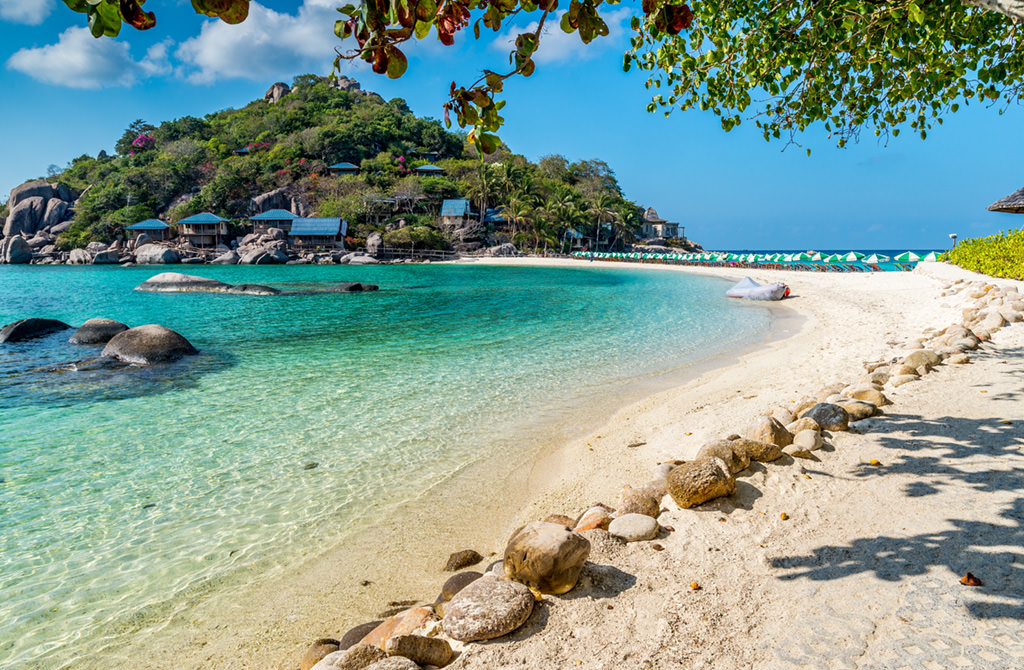
12. Koh Tao > Bangkok (remaining days)
Take the ferry from Koh Tao to Koh Samui, from where you can get a quick flight back to Bangkok. If you have time left (and didn’t extend your stay at any of the stops, which chances are you did), you can then continue to explore Bangkok or take day trips in the area. Consider going to Kanchanaburi or Khao Yai National Park to cap off your Thailand itinerary.
Alternatively, you could skip the Gulf Coast and head east instead. From Bangkok pop down to the small town of Trat, then take a ferry to Koh Chang or Koh Kood. These islands are (still) somewhat less densely developed and make for an interesting alternative option.
Itinerary planning tips
How to shorten the route
The above itinerary is intended for 4 weeks if you want to do it all. I think a month is actually the perfect amount of time for exploring all the major sights in Thailand.
If you have 3 weeks, then follow the sections on Bangkok and northern Thailand, but then pick either the Andaman or the Gulf Coast for your last week on the beaches and islands.
If you have 2 weeks, then do Bangkok, Sukhothai and Chiang Mai in week one. From there, fly down to one of the southern coasts for a week of nature and beaches.
How can you plan your own itinerary?
Thailand has so much to offer that you can easily make your own plans and even improvise during your trip. Since transportation in Thailand is so easy and accommodation so available, it’s easy to decide to stay longer, take side excursions, or even totally alter your plans.
Still, it’s good to have at least a rough plan, especially if it’s your first time in Thailand or you’re new to traveling in this part of the world.
I recommend checking out several Thailand itineraries such as the ones presented here and using them as a template. Research different places, see how various destinations connect on the map, and create a route based on what places seem to interest you most.
When I first travelled in Thailand, I followed a standard itinerary pretty much 70% of the way, but made various tweaks based on my own travel goals.
How can you plan a one-week trip in Thailand?
Is one week enough to see Thailand? To be honest, I don’t know!
I get a lot of emails from people attempting to craft a perfect 6-day whirlwind Thailand itinerary, but I haven’t traveled in this way myself.
I’ve spent at least a couple of weeks on each of my trips to Thailand, so I was not in the mindset that I had to see as much as possible within just a few days. The logistics of a one-week trip also get a lot more precious with less room for mistakes or delays, making it more challenging to recommend a ‘perfect’ route.
If you feel there is a lot of pressure on your one-week Thailand trip to see or do as much as you can, then it may make sense to book an organized tour.
What is the best time to travel in Thailand?
If you are in Thailand for a short time and need the weather to be ‘perfect,’ you may wish to go in the tourist high season of November to February. But outside of these months, you’ll have other advantages such as lower costs, more available accommodation, and fewer crowds.
Keep in mind there is a rainy season in Thailand. Broadly speaking, the rainiest months are from September to October. The monsoon has a different length on each coast though: roughly May to October on the west coast and September until December on the east coast.
How can you get around in Thailand?
Don’t worry too much about travel logistics as there are always plenty of options. Essentially all places you’d ever want to visit as a tourist are connected by public bus, train, or convenient local tours.
To know how to get from A to B in Thailand (and to book bus or train tickets online), I recommend using the local booking platform 12Go Asia.
What are the best places for first-timers?
Honestly, there are so many places in Thailand that are great whether it’s your first visit or your tenth. But Bangkok, Chiang Mai, Chiang Rai, Kanchanaburi, Ayutthaya islands like Koh Phangan, and the resorts on Phuket are highly popular destinations. You can read more about Thailand travel destinations here.
Beyond Thailand
Planning to travel the wider Southeast Asia region?
If you follow the first parts of this route, you can connect this seamlessly to Laos via Chiang Rai and the border at Huay Xai. You can enter Laos either by bus or the so-called slow boat.
Will you end up in the south of Thailand? Then you can easily extend your trip to Malaysia or Indonesia.
Some travelers skip Ayutthaya and Sukhothai and instead travel from Bangkok to Siem Reap in Cambodia to see the temples of Angkor Wat.
If you’re planning a trip through Southeast Asia, be sure to see my Southeast Asia itinerary advice.
Some links may be affiliate links, meaning I may earn commission from products or services I recommend. For more, see site policies.
Posted DEC 09, 2022
· Last Updated Dec 09, 2022

